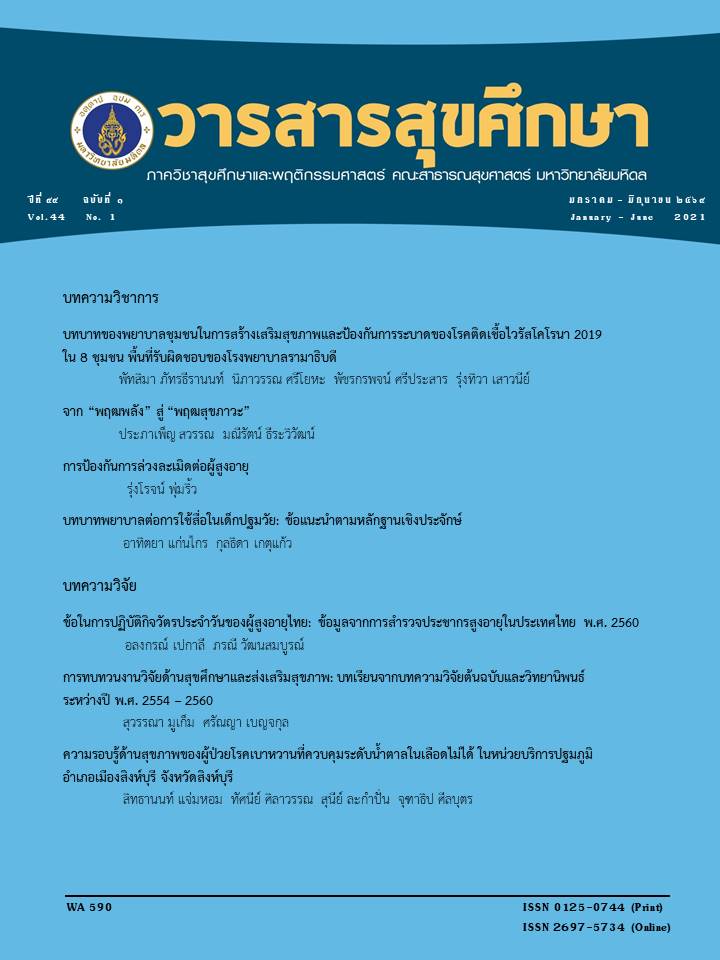Health Literacy of Diabetic Patients with Uncontrolled Blood Sugar Levels in Primary Care Units, Muang District, Singburi Province
Keywords:
Health Literacy, Blood Sugar Level, Diabetic Patients, Primary CareAbstract
The proportion of diabetic patients who cannot control their blood sugar levels remains high and is a cause of complications affecting the quality of life of the patients. The cross-sectional descriptive research aimed to assess health literacy and analyze factors associated with health literacy of diabetic patients with uncontrolled blood sugar levels in primary care units, Muang District, Singburi province. Samples were 155 patients aged 35 or older who had been diagnosed with type 2 diabetes mellitus, received services at the primary care units in Muang District, Sing Buri Province in 2016, and could not control blood sugar levels (HbA1C≥7%). Four out of eleven primary care units were randomly sampled and patients were sampled from the treatment registration by simple random sampling method. Data were collected by using interview form and were analyzed by using frequency, percentages, means, standard deviations, and Chi-square test at the significant level of 0.05.
The results showed that 62.6% of diabetic patients with uncontrolled blood sugar levels had the overall health literacy at a high level, of which a high level of functional health literacy; 65.8%, communicative or interactive health literacy; 59.4% and critical health literacy; 67.7%. Factors statistically associated with the overall health literacy were history of complications (p=0.045) self-assessment (p=0.033) and overall self-management (p=0.041). Therefore, health literacy for blood sugar control should be strengthened among diabetic patients with uncontrolled blood sugar levels, especially in patients who have had complications, along with promoting self-management of patients emphasized on self-monitoring and self-reinforcement.
References
Health Data Center report. อัตราป่วย รายใหม่ของโรคเบาหวานต่อประ ชากร [อินเทอร์เน็ต]. 2559. [เข้าถึงเมื่อ 11 มีนาคม 2560]. เข้าถึงได้จาก: http://hdcservice.moph.go.th/hdc/reports/report.php?source=pformated/format1.php&cat_id=6a1fdf282fd28180eed7d1cfe0155e11&id=eeeab22e386d32e7f5f5ecefebce 0001
HDC report. ร้อยละผู้ป่วยโรคเบาหวานที่ควบคุมระดับน้ำตาลได้ดี ปีงบประมาณ 2559 [อินเทอร์เน็ต]. 2559. [เข้าถึงเมื่อ 11 มีนาคม 2560]. เข้าถึงได้จาก: http: //hdcservice.moph.go.th/hdc/reports/ report.php?source=pformated/format1.php&cat_id=cf7d9da207c0f9a7ee6c4fe3f09f67dd&id=137a726340e4dfde7bbbc5d8aeee3ac3
HDC report. อัตราป่วยรายใหม่ของโรคเบาหวานต่อประชากร [อินเทอร์เน็ต]. 2559. [เข้าถึงเมื่อ 11 มีนาคม 2560].เข้าถึงได้จาก: http://203.157.102.117/hdc/reports/report.php?source=pformated/format1.php&cat_id=6a1fdf282fd28180eed7d1cfe0155e11&id=eeeab22e386d32e7f5f5ecefebce0001
HDC report. ร้อยละผู้ป่วยโรคเบาหวานที่ควบคุมระดับน้ำตาลได้ดี เขตบริการสุขภาพที่ 4 จังหวัดสิงห์บุรี ปีงบประมาณ 2559 [อินเทอร์เน็ต]. 2559. [เข้าถึงเมื่อ 11 มีนาคม 2560]. เข้าถึงได้จาก: http: //203.157.102.117/hdc/reports/report. php?source=pformated/format1.php &cat_id=cf7d9da207c0f9a7ee6c4fe3f09f67dd&id=137a726340e4dfde7bbbc5d8aee e3ac3
Key Performance Indicators. ร้อยละของผู้ป่วยโรคเบาหวานที่ควบคุมได้ [อินเทอร์เน็ต]. [เข้าถึงเมื่อ 2 กรกฎาคม 2563]. เข้าถึงได้จาก: http://healthkpi.moph.go.th/kpi/kpi-list/view/?id=169
สำนักนโยบายและยุทธศาสตร์ สำนักงานปลัดกระทรวงสาธารณสุข. สรุปรายงานการป่วย พ.ศ. 2557. กรุงเทพฯ: สำนักงานกิจการโรงพิมพ์องค์การสงเคราะห์ทหารผ่านศึก ในพระบรมราชูปถัมภ์; 2557.
Mayo Clinic Staff. Risk factors [อินเทอร์เน็ต]. 2561. [เข้าถึงเมื่อ 5 ธันวาคม 2561]. เข้าถึงได้จาก: http:// www.mayoclinic.org/diseases-conditions/diabetes/basics/risk-factors/con-20033091
วรรณรา ชื่นวัฒนา. พฤติกรรมการดูแลสุขภาพตนเองของผู้ป่วยโรคเบาหวาน ตำบลบางแม่นาง อำเภอบางใหญ่ จังหวัดนนทบุรี. วารสารวิชาการ มหาวิทยาลัยปทุมธานี 2557;3:163-170.
World Health organization. Diabetes [อินเทอร์เน็ต]. 2563. [เข้าถึงเมื่อ 2 กรกฎาคม 2563]. เข้าถึงได้จาก: https://www.who.int/news-room/fact-sheets/detail/diabetes
De Castro SH, Brito GN, & Gomes MB. Health literacy skills in type 2 diabetes mellitus outpatients from an university-affliated hospital in Rio de Janeiro, Brazil. Diabetology & metabolic syndrome 2014;6(1):126.
ชะนวนทอง ธนสุกาญจน์ และนรีมาลย์ นีละไพจิตร. การสำรวจความรู้แจ้งแตกฉานด้านสุขภาพ (Health literacy) ของผู้ป่วยโรคเบาหวานและความดันโลหิตสูง [อินเทอร์เน็ต]. 2559. [เข้าถึงเมื่อ 5 มกราคม 2560]. เข้าถึงได้จาก: http://www.hed.go.th/news/5523.
Wayne WD. Biostatistics: A Foundation of Analysis in the Health Sciences. 6th ed. New York: John Wiley & Sons Inc.; 1995.
ทัศนีย์ ขันทอง และคณะ. ผลของโปรแกรมสนับสนุนการจัดการตนเองต่อพฤติกรรมการจัดการตนเองและระดับน้ำตาลในเลือดในผู้ป่วยเบาหวานชนิดที่ 2 ที่ใช้อินซูลิน. วารสารสภาการพยาบาล 2559;28(1):85-99.
Benjamin S, Thomas H, George F, Thomas S. Handbook on Formative and Summative Evaluation of Student Learning. 1st ed. New York: McGraw-Hill; 1971.
สถาบันวิจัยและประเมินเทคโนโลยีทางการแพทย์. สถานการณ์ปัจจุบันและรูป แบบการบริการด้านโรคไม่ติดต่อเรื้อรัง [อินเทอร์เน็ต]. 2557. [เข้าถึงเมื่อ 18 พฤษภาคม 2563].เข้าถึงได้จาก: http://www.imrta.dms.moph.go.th/imrta/images/doc20141107.pdf
ขวัญเมือง แก้วดำเกิง และนฤมล ตรีเพชรศรีอุไร. ความฉลาดทางสุขภาพ. พิมพ์ครั้งที่ 1 กรุงเทพฯ: โรงพิมพ์นิวธรรมดาการพิมพ์ (ประเทศไทย) จำกัด, 2554.
กิตติพศ วงศ์นิศานาถกุล. ความฉลาดทางสุขภาพของผู้ป่วยโรคเบาหวานที่เข้ารับบริการ ณ ศูนย์เวชปฏิบัติครอบครัว โรงพยาบาลพระนครศรีอยุธยา. วารสารสมาคมศาสตร์ป้องกันแห่งประเทศไทย 2561;8(1):49-61.
วรรณรัตน์ รัตนวรางค์ และคณะ. ความฉลาดทางสุขภาพด้านพฤติกรรมการดูแลตนเองกับการควบคุมระดับน้ำตาลในเลือดของผู้ป่วยเบาหวานชนิดที่ 2 จังหวัดชัยนาท. วารสารวิทยาลัยพยาบาลบรมราชชนนีนครราชสีมา 2561;24(2):34-51.
Sarang K. Association of Health Literacy With Self-Management Behavior in Patients With Diabetes. Diabetes care 2004;27(12):2980-2982.
ชลธิรา เรียงคำ และคณะ. ความแตกฉานด้านสุขภาพ การรับรู้สมรรถนะแห่งตนในการดูแลตนเอง อายุ และความสามารถในการมองเห็นในการทำนายพฤติกรรมในการดูแลตนเองในผู้ป่วยเบาหวานชนิดที่ 2. วารสารพยาบาลศาสตร์ 2559;34(4):35-46.
McCleary-Jones, et al. Health Literacy and Its Association with Diabetes Knowledge, Self-Efficacy and Disease Self-Management Among African Americans with Diabetes Mellitus. ABNF Journal 2011;22(2):25-32.
Mirjam P. Fransen. Diabetes self-management in patients with low health literacy: Ordering findings from literature in a health literacy framework. Patient Education and Counseling 2012;88(1):44-53.
Jessica V. The impact of health literacy on diabetes self-management education. Health Education Journal 2018;77(33):349-362.



